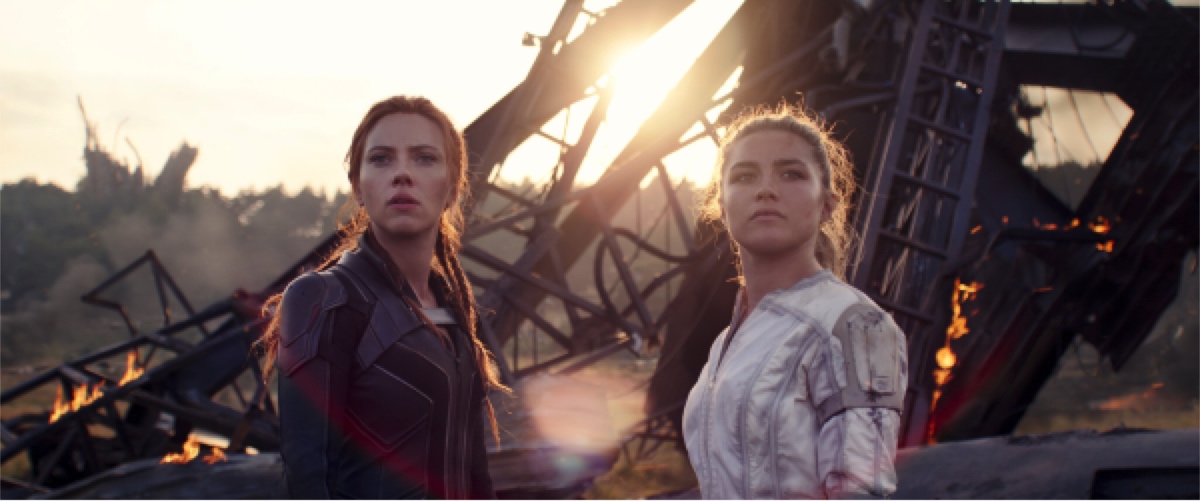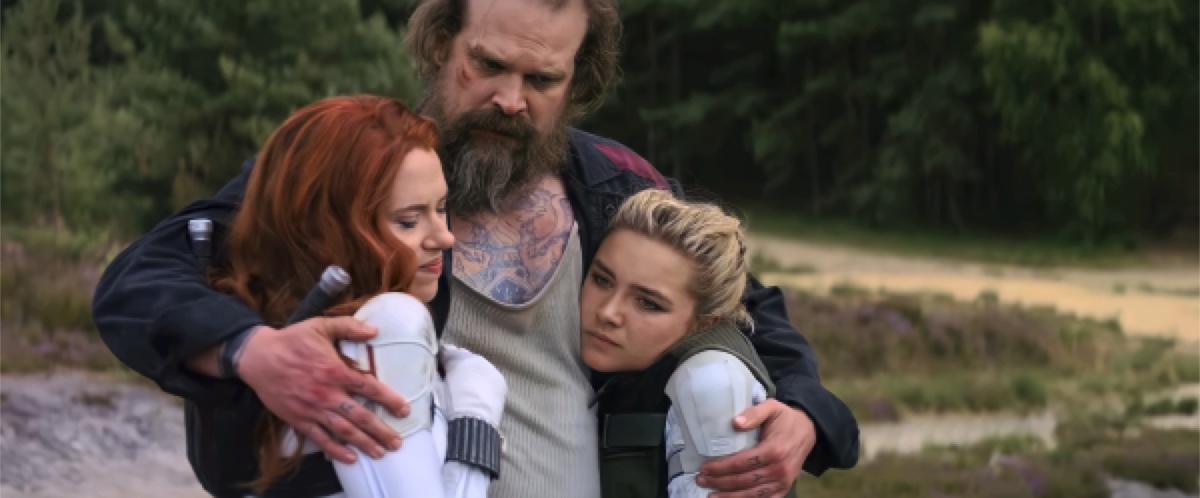I'll add my voice to the many that say it's about time for a solo film for Black Widow, a.k.a. Natasha Romanoff, in the Marvel Cinematic Universe (MCU). Although Black Widow's story is not as gripping as it could have been, it deserves a place in the pantheon of female superhero movies, much like it's DC counterpart, Wonder Woman.
Just to clarify the timeline right away. Yes, Black Widow died in 2019's Avenger's Endgame but this film is situated between the events of Captain America: Civil War and Avengers: Infinity War. It's not an origin story in the strict sense but it does give the fanbase a deeper understanding of what made Natasha Romanoff tick and why, with no actual superpowers, she had a place of honor among the Avengers.
This very earth-bound Marvel outing begins in Ohio in 1995 when young, blue-haired Natasha (Ever Anderson) was growing up with her sister, Yelena (Violet McGraw). Together with Dad Alexi (David Harbour) and Mom Melina (Rachel Weisz), they seemed like a normal family until Dad returns home from work one night declaring that it's time for the adventure they've always talked about…NOW. The family takes off within the hour, being chased by men in black SUV's through their sleepy town to an out-of-the-way spot where an old plane is hidden. Reaching Cuba, the girls are drugged and taken away, while the parents get on with the business of being Russian spies.
Fast-forward 21 years and Natasha (now played by Scarlett Johansson), on the run for siding with Captain America in Civil War, decides to settle an old score: kill Dreykov (Ray Winstone), the one who stole her life, as she was among a group of girls trained as assassins called the Black Widows. She can't do it alone so she decides to get the "family" back together. First, she recruits her "sister," Yelena (now played by Florence Pugh), who was also trained as a Widow by Dreykov. Their first meeting since they were kids is anything but amicable and an apartment-wrecking fight ensues.

Scarlett Johansson and Florence Pugh in "Black Widow." © 2021 Marvel/Disney. All Rights Reserved.
It turns out that Dreykov, through Melina's scientific expertise, has upped the game through a chemical compound that deprives the Widows of free will. Natasha won't stop until she frees the Widows from their violent slavery.
Johansson and Pugh are the movie's anchors and the friendship they developed on set transfers to their encounters on screen. David Harbour as "The Red Guardian," Russia's equivalent to Captain America, provides much comic relief, especially when he tries to squeeze into his old suit. I found it unfortunate that Rachel Weisz's character of Melina, didn't have more screen time and a better contribution to the plot.

Johansson, David Harbour, and Pugh in "Black Widow." © 2021 Marvel/Disney. All Rights Reserved.
Just like any film from the MCU, there's plenty of action sequences, such as when the "sisters" attempt to break Alexi out of a gulag, and snarky one-liners (mostly from Pugh's character). However, at the heart of Black Widow is a story about family and that innate human need to belong with others who love you. Taken from her own family at an early age, then living with a fake family, Natasha has always felt adrift, rootless. Her deepest desire was to belong to a family. As she explains to Yelena, she eventually found that with the Avengers, a family worth sacrificing her life for.
About the Author
Sister Hosea Rupprecht is a member of the Daughters of St. Paul, a religious community dedicated to evangelization with the media. She holds a Master of Theological Studies degree from the University of St. Michael’s College in Toronto and an MA in Media Literacy from Webster University in St. Louis.
Sr. Hosea is director of the East Coast office of the Pauline Center for Media Studies, based in Staten Island, NY, and speaks on media literacy and faith to catechists, parents, youth, and young adults. Together with Father Chip Hines, she is the co-host of Searchlight, a Catholic movie review show on Catholic TV. Sr. Hosea is the author of How to Watch Movies with Kids: A Values-Based Strategy, released by Pauline Books & Media.
For the past 15 years, she has facilitated various film dialogues for both children and adults, as well as given presentations on integrating culture, faith and media.